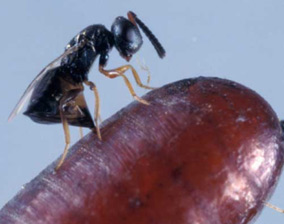Flies should not be, and do not have to be, just a part of farm life. Minimizing flies reduces transmitted diseases to or between livestock and poultry. If flies annoy dairy cows enough, milk production decreases. Young stock are more at risk because repeated annoyance may affect productivity over the lifetime of the animal. When flies leave livestock and poultry buildings or freshly applied fields of manure and congregate in surrounding neighborhoods, farmers face bad publicity and poor neighborhood relations. Really annoyed neighbors can put pressure on legislators to further regulate agriculture. So what can you do to minimize flies?

Scouting for flies routinely, assessing levels of flies and utilizing control measures based on the level of flies is recommended. This is a CONTINUAL process; once is not enough.
Start with Cultural controls around your farm:
- Keep farm as clean, dry and sanitized as possible—this is critical!
- Fix leaking watering systems and have adequate ventilation
- Proper grading and drainage around buildings, including functioning rain spouts
- Keep curbs, corners, cracks and crevices as clean and dry as possible
- Cover and compost manure
- Injection of liquid manure into soil
- Weed and vegetation management

Biological controls may be necessary to control fly populations:
- Parasites that attach to flies
- Fungus and other plant-based controls
- Wasps
- Pheromone, feed stations and light traps
Your last resort should be Chemical controls. Flies can quickly become resistant to chemicals.
- Sprays and fogs—remember “sticker” additives
- Larvicides (directly applied to manure or fed to animals)
- Do NOT overuse!
Space sprays provide quick knock-down of adult flies in enclosed air space. Space sprays have little residual activity, so they are pretty effective in the Northeast. Spray must contact the fly to be effective. With no residual value, they may have to be applied at two or three day intervals. Space sprays are not compatible with adult fly parasitoids.
Websites for purchasing parasitoids – Where trade names or vendors appear, no discrimination is intended, and no endorsement is implied.
Possible websites for purchasing fly control products- Where trade names or vendors appear, no discrimination is intended, and no endorsement is implied.
- www.saferbrand.com
- www.valleyvet.com/ct_farm.html
- www.victorpest.com
- www.tractorsupply.com/livestock/
- www.zoecon.com
If you choose to use biological controls, a “once and done” application of the biologicals will not be adequate to continually control flies. Waiting until fly levels are extremely high also will make it harder to control flies, and may cause conflict with neighbors. Contact your local Cooperative Extension Educator or contact the insectaries that sell biologicals for additional guidance.
Original Source of this information and additional details can be found here: Handout for farmers regarding fly control.

